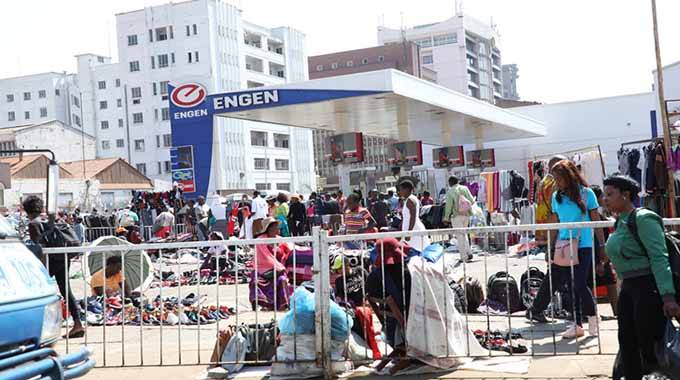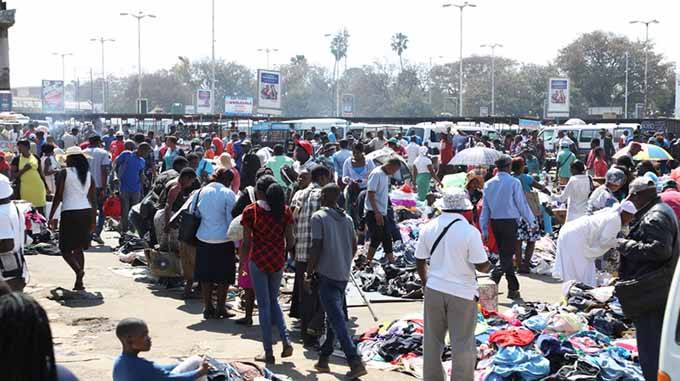City, vendors broken record plays on

Leroy Dzenga Features Writer
Last week, many vendors in the capital woke up to piled wooden debris of what used to be their vending stalls.
Harare City Council had finally worn its no-nonsense face, notching a gear up in its fight to keep the city clean-up exercise.
Many thought the drastic but necessary move was a killer punch in trying to eradicate the menace that illegal vending is.
The sights on the ground suggested that for the first time after multiple attempts, the city fathers seemed to be in control of the deteriorating situation.
A drive around the Central Business District (CBD) last week showed the Sunshine City slowly regaining some of its bristle. For the first time in years, the Market Square rank looked like a place whose structure was a result of engineered thinking.
The human traffic had robbed it of any aesthetic decency, the same for Copacabana and Simon Muzenda Street Rank.
If these places could breathe audibly, the past week would have been a loud sigh of relief.
However, if folks at Town House had celebrated their victory, the ceremony could have come prematurely.
The vendor scourge is still a fair distance from being over as the illegal traders are still on the streets operating from the cleared spaces.
Most are willing to leave the streets from where they operate without paying a single cent to council.
“They should have given us a place to go before chasing us from where we work. Of course if force is used, there is nothing we can do but until they resort to that, we will try and earn a living,” Chiratidzo Sandaka, a second-hand clothes vendor at Market Square said.
Last week, The Herald wrote on the dismay showed by vendors over the abrupt manner in which council descended on their makeshift structures, the sentiment still prevails.
“It would have been better if the authorities had given us notices. We have customers who knew where to find us. Imagine how they will feel if they came to our usual place and find us gone? Our trade is based on fostered relationships and moving from one place to the other will send us out of business,” bemoaned Sandaka.

It appears the removal of wooden stalls has worked in favour of vendors whose wares are now more accessible as they spread them on the ground
As if they were reading from the same script as those from Market Square, those who sell second-hand clothes at corner Leopold Takawira Street, had erected wire lines laying their clothes clearly undermining the city fathers’ efforts.
Givemore Chapera, who sells jackets from the zone, which is literally colonised by informal traders said the alternatives being offered by council are not feasible.
“I don’t believe the people at Harare City Council understand how business
works. They make decisions from their offices without taking us into consideration.
“This is town (CBD), where a lot of people throng daily to conduct their business. Taking us out of this place is taking us out of our areas of survival,” said Chapera.
At the Simon Muzenda Street Rank (formerly Fourth Street Rank) business went on as usual with people appearing undeterred by the sights they had woken up to about a week earlier.
It appears the removal of wooden stalls has worked in favour of vendors whose wares are now more accessible as they spread them on the ground.
Luckson Kuzamba, who sells dolls at the Simon Muzenda rank says the price they have to pay for defiance is alertness.
“Hapana yekutamba m’dhara (There isn’t much we can do, man)! We know they do not want us here. So we are bringing just a few of our wares and in most cases we are ready to bundle them up and flee,” said Kuzamba.
It appears the city is slowly crawling towards its former mess, barely a fortnight after remedial action.
Harare City Council is adamant that this time, they will finally rid the city centre of the illegal vendors.
City Corporate Communications Manager Mr Michael Chideme said they are not relenting in their efforts to bring the sunshine city back to its former glory.
“We are working with all stakeholders including arms of Government, to make sure that we carry out the relocation exercise. We want to ensure that we do not go back to the present setup,” Chideme said.
The contemptuous vendors are going against the city, which is working towards minimising human traffic in the city centre.
“We have removed the illegal structures. In the meantime, while we are working on our modalities for relocation, we are not allowing any other structure to be built there,” said Mr Chideme.
Although it is common cause that many survive on informal trading, the city fathers prefer that it happens within the confines of the law.
“We want to freshen up the city. We want to ensure that the informal sector operates viably at designated areas,” Mr Chideme said.
He added: “The Harare City Council would like to make it categorically clear that the informal sector is part of Harare’s economy. We just want them to operate from places created solely for trading purposes. This includes the various holding bays just outside the city centre, Mbare Musika and all those stall facilities in residential areas.”
Residents on the other hand, are siding with the city’s intention to revive the capital’s Sunshine City status.
Harare Residents Trust Director Mr Precious Shumba said tax paying retailers should not be disenfranchised by informal traders.
“Informal traders should operate from designated points with suitable infrastructure like sanitary facilities. The Central Business District should be really open to business for those businesses that are paying their taxes and rates to the council and bringing revenue to the council,” said Mr Shumba.
“Informal traders are not supposed to be filling our pavements and streets, thereby disrupting the free flow of traffic and human beings. Instead, they have to be accommodated where they can conduct their business without any interference on other people’s businesses,” said Mr Shumba.
The ratepayers’ lobby group however warned that council should be pragmatic in setting up their “designated points.”
Mr Shumba said, “Vendors have also expressed concerns on the high cost of operating from the designated points where the Council charges more money than they raise in a single day, thus the Council has to be more humane and responsive to the needs of the extremely poor who survive on the streets.”
Accepting the so-called designated areas seems like exposing the vendors to the City Fathers’ inefficiencies.
“The City of Harare is collecting revenues from the vendors but has not done much to justify the high charges. They have not built new structures, neither have they explained why the situation does not improve in terms of operating spaces,” said Mr Shumba.
There is a dilemma in the offing. What will prevail, the need to sanitise the city desperately in need of a reprieve or allowing people to eke a living on the streets in the face of inadequate job opportunities?
It is a moral question, which the newly elected council will have to answer soon after assuming office.
As things stand, the vendors are back where they used to be, choosing to disregard attempts by the city to bring Harare closer to being a world class city.
What follows, we can only watch. The cat and mouse game between vendors and the city has gone on for too long; it has become a broken record of sorts.
Feedback: [email protected]








Comments